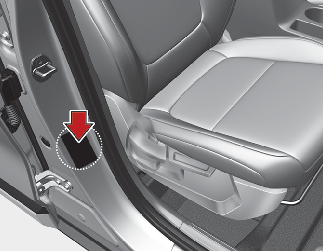Tyres and wheels
Recommended cold tyre inflation pressures
All tyre pressures should be checked when the tyres are cold. "Cold Tyres" means the vehicle has not been driven for at least three hours or driven less than 1.6 km.
Recommended pressures must be maintained for the best ride, vehicle handling, and minimum tyre wear.
For recommended inflation pressure, refer to More Details.
All specifications (sizes and pressures) can be found on a label attached to the driver's side centre pillar.


Tyre underinflation
Inflate your tyres consistent with the instructions provided in this manual. Regularly check the tyre inflation pressure, and correct it as needed: at least twice a month and before any long trips on the road. If you fail to observe this precaution, you may be driving on underinflated tyres, which may not only compromise your vehicle's driving stability, but also lead to tyre damage and the risk of an accident. This risk is much higher on hot days and when driving for long periods at high speeds.
Failure to maintain specified pressure may result in excessive wear, poor handling, reduced fuel economy, deformation of tyre and/or wheel, harsh ride conditions, possibility for additional damage from road hazards, or result in tyre failure.
Tyre pressure
Always observe the following:
-
Check tyre pressure when the tyres are cold. (After vehicle has been parked for at least three hours or hasn't been driven more than 1.6 km since startup.)
-
Check the pressure of your spare tyre each time you check the pressure of other tyres.
-
Never overload your vehicle. Be careful not to overload a vehicle luggage rack if your vehicle is equipped with one.
-
Warm tyres normally exceed recommended cold tyre pressures by 28~41 kPa. Do not release air from warm tyres to adjust the pressure or the tyres will be underinflated.

Tyre Inflation
Overinflation or underinflation can reduce tyre life, adversely affect vehicle handling, and lead to sudden tyre failure. This could result in loss of vehicle control and potential injury.
- Contains Topics
- Checking tyre inflation pressure
- Tyre rotation
- Wheel alignment and tyre balance
- Tyre replacement
- Compact spare tyre replacement
- Wheel replacement
- Tyre traction
- Tyre maintenance
- Tyre sidewall labeling
- Tyre terminology and definitions
- All season tyres
- Summer tyres
- Snow tyres
- Tyre chains
- Radial-ply tyres
- Low aspect ratio tyre